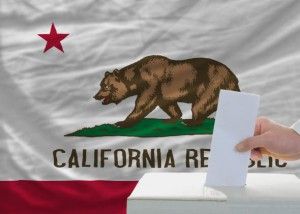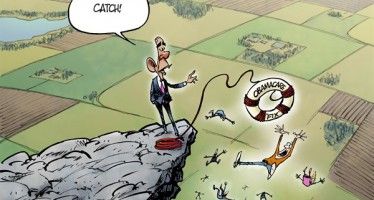What initiatives are on the November ballot?
 Voters have been warned for a while to be prepared for a seemingly never-ending series of ballot measures, and on Thursday the secretary of state released the final list of what initiatives qualified.
Voters have been warned for a while to be prepared for a seemingly never-ending series of ballot measures, and on Thursday the secretary of state released the final list of what initiatives qualified.
Seventeen total. And while voters will read and learn more as the campaigns unfold between now and Election Day, here is a quick reference guide to get your bearings.
Referendum to Overturn Ban on Single-Use Plastic Bags: This is as it sounds. In 2014, the Legislature passed a ban on single-use plastic bags. So a “yes” vote would uphold the ban. A “no” vote would overturn it.
To uphold the law would ban the use of single-use carryout bags, except for perishable items. It would also impose a fee of at least $.10 per paper bag or thicker plastic bag if the customer didn’t provide a reusable one.
The ban actually died on the Assembly floor in 2014 three days before it passed. What changed? A deal was struck between the United Food and Commercial Workers Union and Safeway creating the $.10 fee, which will be kept by the grocer/retailer.
Plastic Bags, Part II: If the plastic bag ban is upheld by voters, this initiative would divert the $.10 fees for bags to a state fund to pay for environmental programs. This would be in lieu of the money going to the grocers.
Campaign Finance (Poll): This is basically just an elaborate poll. It’s a non-binding measure that allows voters through the ballot process to log their approval or disapproval of campaign finance law in the country.
A similar measure got tied up in court in 2014, as opponents called it a ploy to drive voter turnout. But in January, the state Supreme Court ruled it was allowable, and so here it is.
Specifically at question is the 2010 Citizens United ruling where the U.S. Supreme Court allowed for corporations and labor unions to spend unlimited sums in support or opposition of a political candidate.
Guns and Ammo: This is Lt. Gov. Gavin Newsom’s pet project. This would ban magazines of 11 rounds or more, require background checks for ammunition and require the state to share data in the FBI’s background check system, among other things.
However, a bill passed by the Legislature on Thursday but not signed yet by Gov. Jerry Brown would amend this ballot initiative (yes, it amends something that isn’t yet law) to further limit who can purchase ammunition to both persons whose data matches up with the Automated Firearms System and to those who have a ammunition purchase authorization. There are some exceptions.
Naturally, this sidestep of Newsom to amend his measure ruffled his feathers, dragging him and Senate President Pro Tem Kevin de Leon, the bill’s sponsor, into a public disagreement.
“This last-minute, anti-democratic, poison pill sneak attack makes you wonder if the Pro Tem cares about himself more than he cares about doing the right thing,” said Newsom spokesman Dan Newman, according to The Sacramento Bee. “Is he someone who truly respects the will of the voters and wants to reduce gun violence or is he merely a self-serving cynic completely consumed with petty personal grudges?”
Death Penalty Repeal: This repeals the death penalty as the maximum punishment for murder and replaces it with life without parole, applying retroactively to those already sentenced to death.
This has a provision mandating those who’ve been sentenced to life without parole to work, with 60 percent of their income possibly going towards restitution to victims.
The Opposite of a Death Penalty Repeal: And for those who think the death penalty should stay as the ultimate sentence for murder, this measure would speed up the process by implementing a time limit on the lengthy appeals process, by assigning the superior court for the initial review and by limiting the number of successive petitions.
Like the competing measure, this would impose a work requirement for restitution to victims.
Drug Pricing: This would set pharmaceutical prices for any state agency to be as low as what the U.S. Department of Veterans Affairs pays — the VA benefits from federally mandated cost controls.
According to KPCC, the measure would apply to “any program in which the state is the ultimate payer for a drug,” which includes: Medi-Cal fee-for-service plans, CalPERS (provides health benefits to current and retired state employees), prison inmates and people receiving AIDS drugs from the government.
Condoms in Porn: This may as well be called the Condoms In Porn Act, because it would require porn actors to wear condoms during the filming of sexual intercourse.
It also requires that producers provide testing and vaccinations for STDs. And for what it’s worth, producers would also have to post the condom requirements at the job site.
No Blank Checks Initiative: This would require any bond of $2 billion or more for a state project to go before the voters for approval.
As dull as that sounds, it could have a dramatic impact on Gov. Jerry Brown’s legacy, in that it would likely put funding for the bullet train and the twin tunnels water project up to a vote of the people.
School Bond: This would authorize $9 billion in bonds for school construction and modernization, supported by a coalition of school districts and school developers. Pretty self-explanatory.
The measure failed to qualify in 2014, however, amid opposition from Gov. Jerry Brown, who said at the time local school construction was best left up to local control.
Earlier this year, Brown reiterated his opposition, calling the initiative a “blunderbuss effort that promotes sprawl and squanders money that would be far better spent in low-income communities,” according to EdSource.
FYI: Blunderbuss is a “blundering person,” according to Merriam-Webster. It’s also an old fashioned, muzzle-loading gun.
Prop. 30 extension: This is a 12-year extension of Prop. 30, which was a seven-year temporary tax on earnings of more than $250,000 annually to bolster education funding, with the extension coming two years early.
Prop. 30 passed to stave of imminent sharp cuts in education. Now that the economy has recovered, proponents want to keep the money flowing and now hospitals want a cut too.
The extension would allow a quarter-cent sales tax that was part of Prop. 30 to expire, but would add up to $2 billion in funding per year for Medi-Cal, the state’s Medicaid program.
As part of Prop. 30, the program was supposed to receive several layers of accountability, including a state-run audit of the fund that doles out the money to schools that still hasn’t happened. The controller’s office previously told CalWatchdog the audit would likely happen before voters have to decide.
California Legislature Transparency Act: The CLTA is a constitutional amendment requiring the Legislature to make available online the final version of a bill at least 72 hours prior to a vote on either the Assembly or Senate floor. It would also require all open legislative meetings be recorded with the videos posted online within 24 hours and would give permission to individuals to record and share their own videos of open meetings.
Assembly Speaker Anthony Rendon, D-Lakewood, is currently negotiating with CLTA proponents over changes proposed by the Legislature — but the negotiations are not going well.
Multilingual Education: This would repeal most of Prop. 227, which in 1998 placed heavy restrictions on bilingual educations for English learners in favor of English-immersion education.
Why would voters overturn their prior decision? Education Week framed the debate well. Proponents argue new data shows the value of bilingual education, native English speakers would be allowed access to a bilingual education (if they choose), and because we live in a different world with rapidly changing demographics.
Why would voters keep Prop. 227 on the books? Ron Unz, a former candidate for U.S. Senate and governor who pushed for Prop. 227, argued that an overall improvement over a year-period in standardized test scores shows Prop. 227 worked. And others would likely make a nativist argument: This is America, and residents should learn English.
Medi-Cal Hospital Reimbursement: This one is a little confusing. The federal government contributes to the state’s health care program for low-income patients, called Medi-Cal. In order to get this money, the state has to contribute matching funds.
In 2009, the state passed a law taxing hospitals to help contribute to the state’s portion of the Medi-Cal funding to get the money from the feds. However, the state was diverting some of this money into the general fund.
So, this measure amends the state Constitution requiring these funds go to where they are intended.
It would require a two-thirds vote of the Legislature to amend the fee allocation program only when the changes would “amend or add provisions that further the purposes of the Act.” It would require voter approval to repeal or replace the program with a “similar statute imposing a tax, fee or assessment unless that similar statute is either.”
Sentencing overhaul: Jerry Brown’s baby. After surviving a legal challenge and rumored sky-high signature collecting fees, this bill made it to the ballot just before the deadline.
Brown’s measure would allow for some nonviolent felons to be paroled early in certain instances, require judges to hold hearings prior to determining whether to try juveniles as an adult, and develop a good behavior, parole-and-sentence credit system for prisoners.
Marijuana Legalization: This would allow individuals, 21 and older, to transport and use up to an ounce of recreational pot. It would allow individuals to grow as many as six plants.
If approved, California would join Alaska, Colorado, Washington and Oregon in allowing recreational pot.
Tobacco Tax: If this passes, smokers would pay a $2-per-pack tax on cigarettes, with a similar increase on other tobacco products and e-cigs containing nicotine. The money will go primarily to healthcare and anti-smoking/tobacco-related health programs.
Editors Note: The American Progressive Bag Alliance sponsored a media dinner hosted by Calwatchdog to discuss and debate the plastic bag ban with journalists in Southern California.
Related Articles
TX anti-drought plan is SWIFT; CA’s is SLOW
In Texas they call their emergency drought alleviation plan SWIFT, short for State Water Improvement Fund for Texas. In
Covered California unplugs most top hospitals from patients
President Obama has been claiming that people can keep their favorite doctors under the Affordable Care Act. But anyone who
Controller Chiang’s payroll website earning praise for openness, transparency
Federal officials continue to reshuffle the management of Healthcare.gov, with Kurt DelBene, a former president of the Microsoft Office Division, tapped as the




